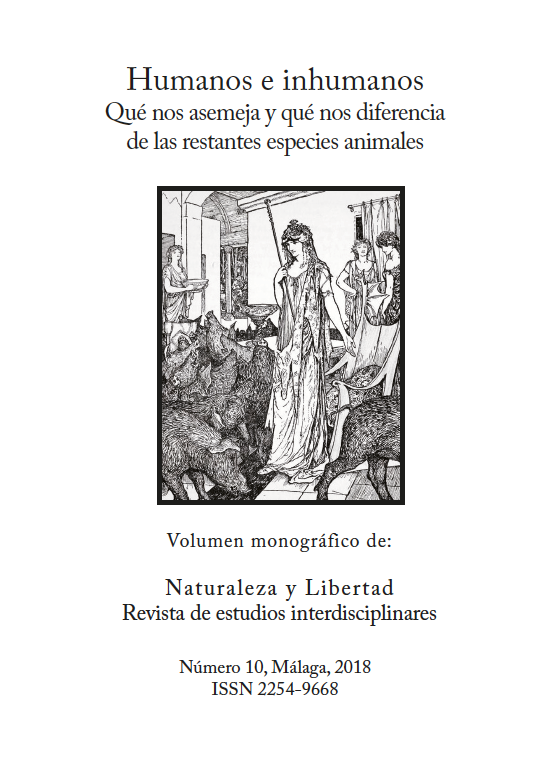Genes, lenguaje, dioses. La encrucijada humana
DOI:
https://doi.org/10.24310/nyl.v10i3.3678Keywords:
Transhumanismo, dioses, lenguaje, genes, encrucijada, evolución, dominio, relevoAbstract
Resumen: La ausencia de una definición universalmente compartida de lo humano favorece y hasta legitima en la actualidad no sólo todo tipo de interven-ción a nivel del genoma y sobre la naturaleza en su conjunto, con sacralizados propósitos eugenésicos, terapéuticos, y en general eudemónicos, sino la consoli-dación del programa transhumanista en cualquiera de sus versiones y su nada lejana expectativa de aplicación. Se trata quizá del último paso en la deriva natu-ralista, marcada por un ciego afán de dominio, propio de los dioses a los que el hombre aspira a sustituir. Esta suplantación de la divinidad por los hombres —los nuevos dioses— puede conducir al nacimiento del relevo humano y, consi-guientemente, a su progresiva desaparición por la doble vía de la superación sustitutiva y de la animalización esclavizadora y seriada. Desde antiguo el hombre juega a creerse un dios, tal ha sido el modo de conjurar su animalidad, sólo en apariencia asumida en la actualidad por un animalismo más ideológico que científico; sin embargo, es ahora cuando el desarrollo tecno-científico le permite saborear a estos curiosos animales los frutos de un poder que parece ilimitado, e incluso soñar con un mundo nuevo nacido de su propia creación. Paradógica-mente, la claudicación animalista no parece contradecir el estertor transhumanista, quizá por ser ambos fruto de la misma fobia antihumana. He aquí lo que llamo “la encrucijada humana”: ¿seguiremos empeñados en perseguir la quimera que nos conducirá a la desaparición progresiva, primero como an-tropóforos ahítos, más tarde como reservorios biológicos para la replicación seriada según decisión de otros seres, ya difusamente imaginables, que nos habrán relevado en el señorío del planeta y acaso del universo? ¿O detendremos la ejecución del programa autolítico desde la plenificación de una autoconciencia estrictamente humana que nos visualice como dueños de nosotros mismos, pero a la vez como hermanos y como hijos de un mismo poder constitutivo, que nos otorga sentido, destino y valor?
Palabras clave: Transhumanismo, dioses, lenguaje, genes, encrucijada, evolución, dominio, relevo.
Genes, languajes, gods. The human quandary
Abstract: The current lack of a universally embraced definition of humankind favours and even legitimises not only all kind of interventions at the genome level and in nature as a whole, with idolised eugenic, therapeutic and in general eudaimonic purposes, but also the consolidation of the transhumanist pro-gramme in any of its versions and the not-so-distant prospect of its application. This is perhaps the last step in the naturalistic drift, characterised by a blind de-sire to dominate, typical of those gods man aspires to replace. The supplantation of divinity by men -the new gods- may lead to the birth of the human substitute and, consequently, to the gradual disappearance of mankind both through the development of enhanced substitutes and through a process of serial and enslav-ing animalization. From ancient times humans have pretended to be gods, thus warding off their animality, which is, at present, only apparently assumed by a more ideological than scientific animalism. Yet, now the techno scientific devel-opment allows these extraordinary creatures to savor the fruits of a seemingly unlimited power and even dream of a new world of their creation. Paradoxically, the renunciation of animalism does not seem to confront the throes of transhumanism, perhaps because both (views) are the result of the same anti hu-man phobia. This is (indeed) what I call “the human quandary”: will we insist on pursuing the chimera that will eventually lead us to our gradual disappearance, first as satiated anthropophora, later as biological reservoirs to be used for serial replications resolved by other beings, already vaguely unthinkable, who will have replaced us in the dominion of the planet and perhaps of the universe? Or will we halt the implementation of the autolytic project through the fulfilment of a truly human self-consciousness which envisages us as masters of ourselves, but at the same time as brethren and children of a single constitutive power granting us sense, destiny and courage?
Keywords: Transhumanism, gods, language, genes, quandary, evolution, dominion, substitute.
Recibido: 24/09/2017 Aprobado: 5/11/2017
Downloads
Metrics
Downloads
Published
How to Cite
Issue
Section
License
Those authors who have publications with this journal, accept the following terms:
1. Copyright and licensing information are clearly described on the journal’s web site: all content published in Naturaleza y Libertad is open acces without limit, and are subject to the Attribution-NonCommercial-ShareAlike 4.0 International (CC BY-NC-SA 4.0) license. The full text of which can be consulted at https://creativecommons.org/licenses/by-nc-sa/4.0/
2. It is the responsibility of the authors to obtain the necessary permissions for the images that are subject to copyright. The authors whose contributions are accepted for publication in this journal will retain the non-exclusive right to use their contributions for academic, research and educational purposes, including self-archiving or deposit in open access repositories of any kind. The electronic edition of this magazine is edited by the Editorial de la University of Malaga (UmaEditorial), being necessary to cite the origin in any partial or total reproduction.
3. This journal allows and encourages authors to publish papers on their personal websites or in institutional repositories, both before and after their publication in this journal, as long as they provide bibliographic information that accredits, if applicable, your posting on it.
4. In no case will anonymous papers be published.





18.png)













